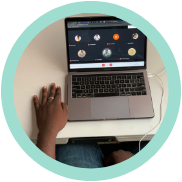
Here we provide research nurses with ‘how-to’ training on designing, planning, operationalising and reporting health studies.
We deliberately say ‘study’ rather than ‘trial’ as these courses apply to most types of health research studies – including clinical trials. For more courses not listed below visit The Global Health Training Centre.
 |
 |
 |
|
|
|
Research Processes and Methods
| Introduction to Clinical Research An overview of the basic concepts of clinical research, focusing on the main areas of why and how clinical research is carried out, the importance of ethics in research, and an outline of the five main clinical study designs. |
English | Español | Français | Português | Swahili | Việt | 中文 |
| ICH Good Clinical Practice E6 (R2) Good clinical practice provides a framework of principles which aim to ensure the safety of research participants and the integrity and validity of data. This course aims to provide the researcher with the basic principles of GCP and how these principles can be applied practically in the research setting. This ICH E6 GCP Investigator Site Training meets the Minimum Criteria for ICH GCP Investigator Site Personnel Training identified by TransCelerate BioPharma as necessary to enable mutual recognition of GCP training among trial sponsors. |
English | Español | Français | Português | Русский | Việt |
| Introduction to Informed Consent The primary aims of informed consent are to protect the research participant from misinformation, exploitation and coercion. This course offers an introduction to the processes and wider factors which need to be taken into consideration when involving participants in clinical research. |
|
| The Research Question The research question forms the foundation of any study and is vital to the effectiveness and validity of the research to be carried out. This course explores the main factors that affect and influence the development of a valid research question. |
English | Español | Français | Việt | 中文 |
| The Study Protocol This course is designed to guide researchers through the basic stages and concepts surrounding the creation of a protocol, the document outlining the design of a study, describing the objectives, methodology and overall organisation of the research to be carried out forming a template and guide to the research process as a whole. |
Part 1 | Première Partie Part 2 | Deuxième Partie |
| Essential Elements of Ethics Protocol authors should address certain ethical issues in the design of studies and document their rationale in a section of the protocol that will be easily understood by review boards and investigators. This eLearning resource will guide the development of a dedicated “Ethics section” of the protocol in which Essential Elements are addressed. This online resource will assist clinical researchers as they write their study protocol to recognize and address common ethical challenges in clinical trials, and ethics committee members as they review and analyse clinical trial protocols in an efficient and comprehensive manner. |
Research Skills
| Children and Clinical Research If children and young people are not given the opportunity of taking part in research, it is very difficult to obtain the evidence needed to improve the health services provided for them. This course aims to give researchers and members of ethics committees confidence in thinking through the challenges of carrying out research with children and young people. |
English | Español |
| Research Ethics Online Training Research Ethics Online Training is adapted from an e-Learning course and resource package designed and produced by the World Health Organization (WHO) for use by internal staff. Research is a vital ingredient for improved global health and scientifically sound and ethically appropriate research is especially important in resource-poor settings where the need for locally applicable research findings is so great. Therefore the WHO has very kindly granted permission for the adaption of this resource in a format and platform that is accessible to all. |
English |
| Ethics in Epidemics, Emergencies and Disasters: Research, Surveillance and Patient Care A comprehensive exploration of the wide range of ethical issues faced by health professionals and policy makers working in the context of epidemics/pandemics and disaster situations, focusing primarily on the key areas of research, surveillance and patient care. |
|
| Ethics and Best Practices in Sharing Individual-level Research Data Research funders, regulators and researchers are increasingly calling for the sharing of individual-level data from biomedical and public health research. This introductory course aims to describe the potential benefits and risks of sharing data, discusses the ethical challenges involved and proposed best practices insharing research data. |
|
| Research in Global Health Emergencies: Ethical Issues Emergencies are particularly challenging contexts in which to conduct health-related research – while research norms and standards remain important, applying these appropriately in exceptional circumstances needs careful and nuanced consideration. Based on a Nuffield Council on Bioethics report, this course explores core ethical issues that arise during research in global health emergencies, and highlights how they sometimes go beyond those covered in traditional research frameworks. |
Español | Français | Português |
| The Practice and Ethics of Participatory Visual Methods for Community Engagement in Public Health and Health Science If children and young people are not given the opportunity of taking part in research, it is very difficult to obtain the evidence needed to improve the health services provided for them. This course aims to give researchers and members of ethics committees confidence in thinking through the challenges of carrying out research with children and young people. |
English | Español |
| What is Open Science? Open Science is a scientific activity practiced in an open, collaborative and transparent way in all knowledge domains, from fundamental science to social and human sciences. This course presents the concept of open science, as well as the reasons and advantages of practicing open science. This course is aimed at students, researchers and the general public. |
English | Español | Português |
| Introduction to Data Management For Clinical Research Studies Good data management is key to maintaining, processing. analysing and storing high-quality data. This overview is aimed at everyone involved in clinical research. |
Español |
| Data Sharing This course is aimed at early career researchers, postgraduate students and clinical research support staff who are collecting, managing and using health data. |
English |
| Introduction to Collecting and Reporting Adverse Events A general introduction to adverse events during clinical research and how to deal with them when they occur, suitable for everyone involved in clinical research. |
English |
| Tools for Scientific Dissemination This course will help you plan and execute scientific advertising activities in different formats and targeting different audiences. |
English | Español | Português |
| Data Safety Monitoring Boards for Clinical Trials This course examines the role of Data Safety and Monitoring Boards (DSMBs) in assessing the overall progress of a clinical trial and analysing the safety and efficacy data. |
English | Français |
| How to Conduct GCP Inspections/Audits at the Clinical Investigator Site Aimed at regulatory good clinical practice (GCP) inspectors and sponsor auditors who audit clinical trials, this course covers the procedures involved in planning, conducting and reporting inspections/audits, particularly at clinical investigator sites. |
English |
| Children and Clinical Research If children and young people are not given the opportunity of taking part in research, it is very difficult to obtain the evidence needed to improve the health services provided for them. This course aims to give researchers and members of ethics committees confidence in thinking through the challenges of carrying out research with children and young people |
English | Español |
Clinical Skills Training
| INTERGROWTH-21st Course on Maternal, Fetal and Newborn Growth Monitoring This course communicates the methodology of maternal, fetal and newborn growth monitoring and the application of the INTERGROWTH-21st international growth standards to make judgement about appropriateness of growth. |
English | Español | Italiano | Português |
| Preterm Infant Feeding and Growth Monitoring: Implementation of the INTERGROWTH-21st Protocol The INTERPRACTICE-21st Project promotes the optimal postnatal growth of preterm infants and standardises growth measurement in selected populations around the world. It is based on the implementation of the INTERGROWTH-21st international standards for preterm postnatal growth and evidence-based feeding recommendations based on human milk. This course provides a background on preterm birth, gastrointestinal development in preterm infants, and feeding recommendations for the routine care of preterm infants. |
English | Español | Italiano | Português | Русский |
| COVID-19 in pregnancy, delivery and the neonatal period COVID-19 is a global emergency. Its effects on pregnancy and the newborn include the direct spread of disease to pregnant women and their babies and indirectly, the reduction in access to essential maternal and newborn healthcare services resulting in maternal and newborn morbidity and mortality. The aim of the course is to provide healthcare providers with evidence-based recommendations for disease prevention and management of pregnant women and their babies during the COVID-19 pandemic and thereby lessen the adverse maternal and newborn outcomes from the disease. |
|
| Neurological Complications of COVID-19 Neurological infectious diseases pose some of the greatest challenges to clinicians. The presenting clinical syndromes are often elusive, determining the causative organisms can be problematic, and there is often little evidence to guide treatment. Whilst many are rare, others are extremely common, particularly in tropical climates, and collectively the disease burden is considerable. These Neurological Infectious Diseases Elearning modules are here to help! They are aimed at medics of all grades, from undergraduate students to consultants and senior academics. |
|
| COVID-19: Management of Infection Caused by the Novel Coronavirus The course is one of the initiatives of the Oswaldo Cruz Foundation (Fiocruz, Brazil) which, in the face of the health emergency scenario, seeks to contribute to the strengthening of the health system in order to face this and other health challenges. The course is introductory in nature: it provides training for professionals working in health services for the clinical management of the disease. Besides being essential in the response to the pandemic, these professionals have been exposed in terms of work overload and risk of infection. The course content is based on World Health Organization guidelines plus recommendations from the literature and health experts. The modules comprise brief texts, coupled with classes and videos that address relevant aspects for preventing and coping with the disease. In addition, the course includes a set of reliable sources with frequent updates on COVID-19. |
Português |
| Speech therapy healthcare: oral sensory-motor disorders in the field of neonatology The physical, psychological, social, and financial burden of oral sensory-motor disorders in pre and full term infants strongly impacts the patients, their caregivers, and the healthcare system that supports them. In sharp contrast to these multifaceted and often long-term consequences, recognition of these disorders in the medical and political communities is strikingly poor and has not changed meaningfully over the past years. This course aims to heighten awareness and amend this collective neglect. |
|
| Maternal Infections Appropriate prevention, diagnosis and treatment of infections during pregnancy can reduce maternal and neonatal morbidity and mortality, and mitigate the adverse effects on both mothers and newborns. For each major maternal infection, this course addresses the global burdens, the effects on mother and fetus, diagnosis and treatment based on current evidence. |
|
| Obstetric Fistula Each year between 50,000 to 100,000 women worldwide are affected by obstetric fistula and it is estimated that more than 2 million young women live with untreated obstetric fistula in Asia and sub-Saharan Africa. This course addresses the epidemiology, etiology, pathogenesis, prevention, diagnosis, classification and management of obstetric fistula. |
English | Français |
| Ethics of Ancillary Care in Research Ancillary care is healthcare that research participants need but that is not required by to answer the researchers’ scientific question or to avoid or mitigate harm resulting from participation in the research. This course covers the main ethical questions associated with providing or facilitating ancillary care, including the various philosophical approaches to establishing whether or not researchers have ancillary care obligations. |
|
| Ethics and Best Practices in Sharing Individual-level Research Data Research funders, regulators and researchers are increasingly calling for the sharing of individual-level data from biomedical and public health research. This introductory course aims to describe the potential benefits and risks of sharing data, discusses the ethical challenges involved and proposed best practices insharing research data. |
|
| Introduction to Reviewing Genomic Research This introductory course provides an overview of how genomic research differs from other research, and the specific ethical issues to consider when conducting an ethics review of this research. |
English | Español | Français | Português |
| What is Open Science? Open Science is a scientific activity practiced in an open, collaborative and transparent way in all knowledge domains, from fundamental science to social and human sciences. This course presents the concept of open science, as well as the reasons and advantages of practicing open science. This course is aimed at students, researchers and the general public. |
English | Español | Português |
| Open Access Open Access refers to the practice of making research publications freely available to the public so that anyone can read and use them. It can also come in the form of reusing content shared by other researchers. This course aims to help you understand a little more about the main concepts, historic milestones, different forms of applications, and various initiatives both on the international scene and Brazilian experiences of Open Access. This course is aimed at students, researchers and the general public. |
English | Español | Português |